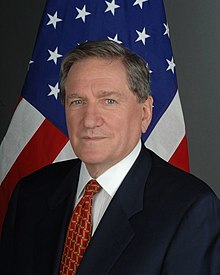Richard Holbrooke | |
|---|---|
 | |
| United States Special Representative for Afghanistan and Pakistan | |
| In office January 22, 2009 – December 13, 2010 | |
| President | Barack Obama |
| Preceded by | Position established |
| Succeeded by | Marc Grossman |
| 22nd United States Ambassador to the United Nations | |
| In office September 7, 1999 – January 20, 2001 | |
| President | Bill Clinton |
| Preceded by | Peter Burleigh (acting) |
| Succeeded by | John Negroponte |
| 18th Assistant Secretary of State for European and Canadian Affairs | |
| In office September 13, 1994 – February 21, 1996 | |
| President | Bill Clinton |
| Preceded by | Stephen A. Oxman |
| Succeeded by | John C. Kornblum |
| United States Ambassador to Germany | |
| In office October 19, 1993 – September 12, 1994 | |
| President | Bill Clinton |
| Preceded by | Robert M. Kimmitt |
| Succeeded by | Charles E. Redman |
| 14th Assistant Secretary of State for East Asian and Pacific Affairs | |
| In office March 31, 1977 – January 20, 1981 | |
| President | Jimmy Carter |
| Preceded by | Arthur W. Hummel Jr. |
| Succeeded by | John H. Holdridge |
| Personal details | |
| Born | Richard Charles Albert Holbrooke April 24, 1941 New York City, U.S. |
| Died | December 13, 2010 (aged 69) Washington, D.C., U.S. |
| Political party | Democratic |
| Spouses |
|
| Children | 2 |
| Education | Brown University (BA) |
Richard Charles Albert Holbrooke (April 24, 1941 – December 13, 2010) was an American diplomat and author. He was the only person to have held the position of Assistant Secretary of State for two different regions of the world (Asia from 1977 to 1981 and Europe from 1994 to 1996).
From 1993 to 1994, he was U.S. Ambassador to Germany. He was long well-known among journalists and in diplomatic circles. Holbrooke became familiar to the wider public in 1995 when he, together with former Swedish prime minister Carl Bildt, brokered a peace agreement among the warring factions in Bosnia leading to the signing of the Dayton Peace Accords. Holbrooke was a prime contender to succeed Warren Christopher as Secretary of State but was passed over in 1996 as President Bill Clinton chose Madeleine Albright instead.
From 1999 to 2001, Holbrooke served as U.S. Ambassador to the United Nations. He was an adviser to the presidential campaign of Senator John Kerry in 2004. Holbrooke then joined the 2008 presidential campaign of Senator Hillary Clinton and became a top foreign policy adviser. Holbrooke was considered a likely candidate for Secretary of State had Kerry or Hillary Clinton been elected president. In January 2009, Holbrooke was appointed as a special adviser on Pakistan and Afghanistan, working under President Barack Obama and Secretary of State Hillary Clinton.[1] During his career, Holbrooke worked to improve the lives of refugees, particularly the Hmong of Indochina.[2] On December 13, 2010, Holbrooke died from complications of an aortic dissection.[3]
Holbrooke's unfulfilled ambition was to become Secretary of State; he, along with George Kennan and Chip Bohlen, were considered among the most influential U.S. diplomats who never achieved that position. Several considered Holbrooke's role in the Dayton Accords to merit the Nobel Peace Prize.[4][5][6][7]
- ^ Cite error: The named reference
Foreign Policywas invoked but never defined (see the help page). - ^ Cite error: The named reference
:0was invoked but never defined (see the help page). - ^ Alter, Jonathan (December 14, 2010). "Richard Holbrooke: An American in Full". Newsweek. Retrieved April 29, 2018.
- ^ Moreau, Ron (December 14, 2010). "Holbrooke in the Trenches". Newsweek. Retrieved April 29, 2010.
- ^ Alter, Jonathan (January 16, 2011). "Richard Holbrooke's Lonely Mission". Newsweek. Retrieved April 29, 2018.
- ^ "Richard Holbrooke: A Disappointed Man". Newsweek. December 14, 2010. Retrieved October 18, 2018.
- ^ "An American in Full". Newsweek. December 14, 2010. Retrieved October 18, 2018.